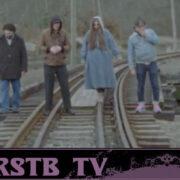Chis Forsyth 

I’ve heard Chris Forsyth describe his new record as reaching for skinny tie Popul Vuh territory, and I can’t argue with the artist on that one. There’s a balance between the sublime and the serrated on Evolution Here We Come. The record riffs on back alley 3AM tension, beaming back the reflections of neon lights from the puddles with a broken prism glare. While it revels in the pre-dawn slink, it doesn’t get hung up on grit. It allows the build up of tension to break and let the glare of morning sun slip in as well. Letting the rally cry of a Richard Thompson cover settle nicely between Bad Moons, tough scars, and mechanical menace, sweat mingles with tears on the record — a desperation that admits the need for a hand to hold.
While Chris often nets comparisons to Television, his works seem more indebted to the protean guitar work of Robert Quine. Like Quine he’s able to slip easily between barbed, brutal moments and the quicksilver ripples of pop. Both impulses shine through on the new record. Where the opener spars with Bill Nace’s tatters of tashigoto and Marshall Allen’s Electronic Valve, by the time he’s slid into the first few notes of “Heaven For A Few,” the amber glow of afternoon sun has washed away the brittle battle that preciously ensued. The angst of “Bad Moon Risen” boils down with the smoke curl resolve of “Hey Evolution,” but both erode in the relief of Stuart Bogie’s flutes on “Long Beach Idyll.”
Certainly it’s easy to argue that any of the last three of Forsyth’s records are high water marks. His live staple, “Dreaming in the Non-Dream,” set the tone for the half-decade to come, balancing his punk hackles with live improv desires. Just as on the last two he ends the album with another side-long stretch that will surely find further legs in the live setting. “Robot Energy Machine” embraces Chris’ motorik pulse, while craning for something a bit more cosmic. The song reflects the tone of the title’s “evolution,” but clouds the benefits of whether that progression is welcome or not. Like much of the album, the closer is conflicted about the future — shining bright with a roiling tension, but looking tentatively at the darkness on the horizon.
Support the artist. Buy it HERE.








